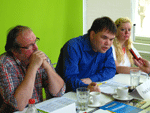Social Watch news
Published on Thu, 2013-08-22 00:00
"Citizen monitoring and accountability of governments, corporations and international institutions are essential for a new development agenda to succeed". Roberto Bissio, Coordinator of Social Watch, shares his reflections on the Social Watch Philippines' National Consultation on the High Level Report on the Post 2015 Agenda. |
Published on Wed, 2013-08-21 00:00
For Bolivia – and generally the rest of Latin America—the demands for economic and social inclusion during the 1960s and 70s were associated to the struggle for greater political participation and the transition to democratic government. Therefore, social organizations devoted their energy to fighting dictatorships, considering that political rights and democratic openness would bring as a consequence the much-awaited economic democratization and the improvements in life standards for the whole population. But political participation in democracy through voting (but delegated in terms of representation to the monopoly of the political parties) and progress in respect for individual political rights (recognition to ethnical, gender and other differences) came together with a liberal economic model based on deeply despotic premises. |
Published on Thu, 2013-08-15 23:37
The Czech Social Watch Coalition released the new National Social Watch Report summarizing the development in the year 2012. The title of the report is Czech Republic: Decline and Resignation and it focuses on social development and gender equity, particularly on the following areas: economics, family and social politics, Roma minority, gender and environmental issues. The year 2012 was not a good one for most inhabitants of the Czech Republic. In 2012, the country still did not reach the level from 2008 and the gap between the neighbouring countries is widening. The government had no vision and positive economic programme, "fiscal consolidation," which meant budget cuts, was its only objective. One-fifth of the working people are endangered by poverty, more women than men. Absence of an effective conception of social housing also represents a problem. Forced moving of people into overpriced unsuitable dormitories didn’t help to solve the situation and only supported further ghettoisation. Therefore trivial personal conflicts, in which Roma people often find themselves, lead to big anti-Roma demonstrations and attempts of pogrom. Last but not least corruption is big and visible problem of Czech politics as well. |
Published on Thu, 2013-08-15 21:56
The commodity dependence of most African countries has intensified, despite claims of remarkable economic performance in recent times, Dr Yao Graham, Coordinator of the Third World Network Africa, has said. Addressing participants at the 14th Review and Strategy Conference of African Initiative on Mining Environment and Society (AIMES), Dr Graham said amidst the deafening rhetoric that Africa is rising; most countries on the continent continue to reel under unfavourable economic conditions. “The economies of most countries on the continent are fragile and this is going side by side with the deafening rhetoric that Africa was rising,” he said, at the opening session of the conference. |
Published on Mon, 2013-08-12 11:39
In 2000, as part of the Millennium Development Goals, governments committed to Goal 8 on a “Global Partnership for Development.” While the other 7 goals dealt with issues that were measurable at the domestic level (percentage of people in poverty, maternal mortality rates, etc.) the Global Partnership for Development was meant to address areas where international cooperation was seen as necessary to make progress towards the goals. But, what were the consequences for human rights and capabilities of how such international cooperation was conceptualized in MDG 8, and of the targets and indicators that were attached to it as representative of progress? |
Published on Wed, 2013-08-07 09:26
The so-called Arab Spring countries are passing through hard conditions, having repeatedly failed in handling the most important causes of the popular revolutions and uprisings, especially the issues of social justice, public freedoms and the establishment of security. The Arab NGO Network for Development (ANND) is aware that political transition periods in all countries where civil conflicts or popular uprisings take place are always difficult and complicated, yet several Arab countries were pushed by many factors into additional dilemmas that could have been avoided under clear visions and honest wills and if the priorities of social mobility and ultimate national goals were sustained. |
Published on Tue, 2013-08-06 00:00
In the past few weeks, the human rights situation in Bahrain has rapidly deteriorated ahead of planned mass protests on August 14th. With many of the country’s most prominent Human Rights Defenders behind bars, local NGOs have inadequate resources to keep up with the unfolding situation, and it is challenging for them to ensure the safety of their members. Bahraini HRDs should not be left to stand alone. We urge international human rights organizations to attempt to visit Bahrain over the coming week, in order to document and monitor ongoing protests, especially on August 14 when Bahrain is expected to come under lockdown. The government has already declared that all protests in the capital Manama are banned. |
Published on Thu, 2013-08-01 15:10
The global financial crisis led to greater job loss and poverty among women than men while rising food prices and responsibility for social reproduction take excessive tolls on the livelihoods of women. Financial crises and austerity measures to combat crises undermine the human rights to work, education, health and nourishment and the capacity to provide care and social reproduction. Their consequences are particularly acute for women who are held responsible for reproduction and face unequal gender relations that function to deny them access to resources and opportunities. Regulation and recovery must therefore be rooted in a human rights based approach taking special note of women's rights and impacts on social reproduction. |
|
Published on Thu, 2013-08-01 07:00
In his last speech as president of the United States, General Dwight Eisenhower, warned in 1961 that “we must guard against the acquisition of unwarranted influence, whether sought or unsought, by the military-industrial complex”. Reformulating this famous alarm, last July 26 Peter Buffett wrote an opinion piece in The New York Times, where, under the title of “The Charitable-Industrial Complex" he explains how "inside any important philanthropy meeting, you witness heads of state meeting with investment managers and corporate leaders. All are searching for answers with their right hand to problems that others in the room have created with their left”. |
Published on Wed, 2013-07-31 21:35
This year Social Watch Philippines and the Alternative Budget Initiative or ABI will particularly scrutinize the Priority Development Assistance Fund or “pork barrel” and the transfers and allocations for the government’s Special Purpose Funds. Department allocations will also be assessed by the Initiative, particularly the allocations for health, education, agriculture, social welfare and the environment. It’s that time of the year again when Congress debates and finalizes the National Budget for 2014. Budget hearings, pork barrels, agency allocations and special purpose funds will be, or should be, buzzwords in media for the next few months. |
SUSCRIBE TO OUR NEWSLETTER











